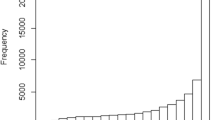Abstract
The relationship between gender and word ending in French is a quasiregular one (e.g., most words ending in -ette are feminine, but not all). As such, the gender of low-frequency irregular forms (e.g., squelette, which is masculine) should take longer to classify than low-frequency regular forms according to neural network models. A regularity effect was found in Experiment 1, but it did not interact with word frequency. It was further revealed that there was difficulty in making gender decisions (Experiment 2) and gender verification responses (Experiment 3) to words whose endings were highly informative of gender, but whose associated article was not. These words were place names beginning with a vowel, like Australie, which do not take an indefinite article and whose definite article is ambiguous (1'). How a neural network might handle these results is discussed, and an alternative account is considered whereby there are two potential sources of gender information, lexical and nonlexical, with the latter being used to confirm the former.
Similar content being viewed by others
REFERENCES
Andrews, S. (1982). Phonological recoding: Is the regularity effect consistent? Memory & Cognition, 10, 565-575.
Bates, E., Devescovi, A., Pizzamiglio, L., D'Amico, S., & Hernadez, A. (1995). Gender and lexical access in Italian. Perception & Psychophysics, 57, 847-862.
Content, A. (1991). The effect of spelling-to-sound regularity on naming in French. Psychological Research, 53, 3-12.
Desrochers, A., Paivio, A., & Desrochers, S. (1989). L'effet de la fréquence d'usage des noms inanimés et de la valeur prédictive de leur terminaison sur l'identification du genre grammatical. Revue Canadienne de Psychologie, 43, 62-73.
Deutsch, W., & Wijnen, F. (1985). The article's noun and the noun's article: Exploration into the representation and access of linguistic gender in Dutch. Linguistics, 23, 793-810.
Glushko, R. J. (1979). The organization and activation of orthographic knowledge in reading aloud. Journal of Experimental Psychology: Human Perception and Performance, 5, 674-691.
MacWhinney, B., Leinbach, J., Taraban, R., & McDonald, J. (1989). Language learning: Cues or rule? Journal of Memory and Language, 28, 255-277.
Plaut, D. C., McClelland, J. L., Seidenberg, M. S., & Patterson, K. (1996). Understanding normal and impaired word reading: Computational principles in quasi-regular domains. Psychological Review, 103, 56-115.
Radeau, M., Mousty, P., & Bertelson, P. (1989). The effect of the uniqueness point in spoken-word recognition. Psychological Research, 51, 123-128.
Seidenberg, M. S., & McClelland, J. L. (1989). A distributed, developmental model of word recognition and naming. Psychological Review, 96, 523-568.
Seidenberg, M. S., Waters, G. S., Barnes, M. A. & Tanenhaus, M. K. (1984). When does irregular spelling or pronunciation influence word recognition? Journal of Verbal Learning and Verbal Behavior, 23, 383-404.
Stanhope N., & Parkin, A. J. (1987). Further explorations of the consistency effect in word and nonword pronunciation. Memory & Cognition, 15, 169-179.
Trésor de la langue française: Dictionnaire des fréquencies. (1971). Paris: Klinksieck.
Tucker, G. R., Lambert, W. E., & Rigault, A. A. (1977). The French speaker's skill with grammatical gender: An example of rule-governed behavior. The Hague: Mouton.
Tucker, G. R., Lambert, W. E., Rigault, A. A., & Segalowitz, N. (1968). A psychological investigation of French speaker's skill with grammatical gender. Journal of Verbal Learning and Verbal Behavior, 7, 312-316.
Author information
Authors and Affiliations
Rights and permissions
About this article
Cite this article
Taft, M., Meunier, F. Lexical Representation of Gender: A Quasiregular Domain. J Psycholinguist Res 27, 23–45 (1998). https://doi.org/10.1023/A:1023270723066
Issue Date:
DOI: https://doi.org/10.1023/A:1023270723066




